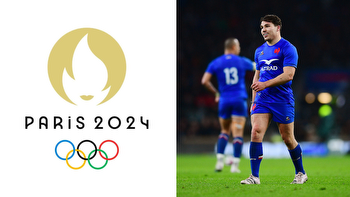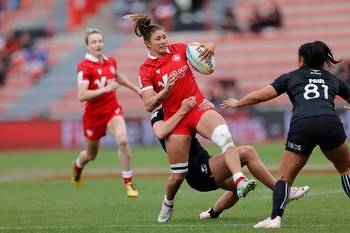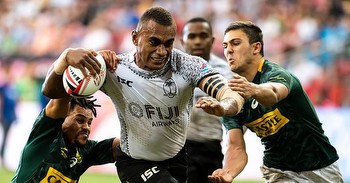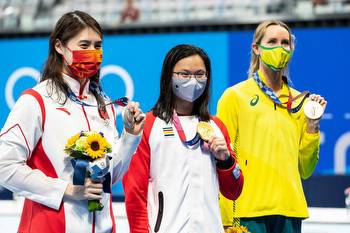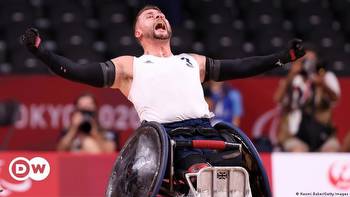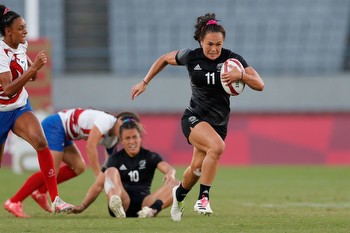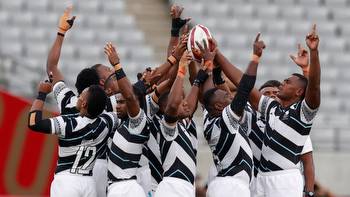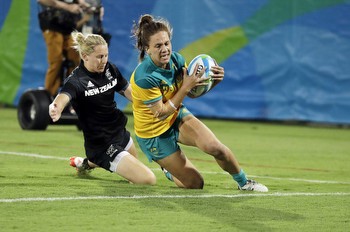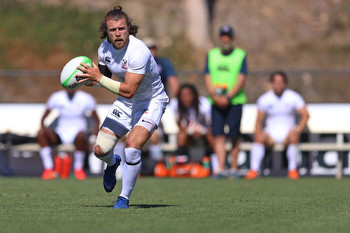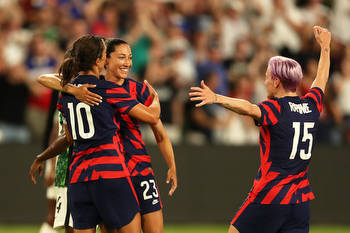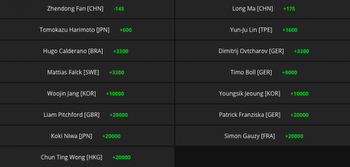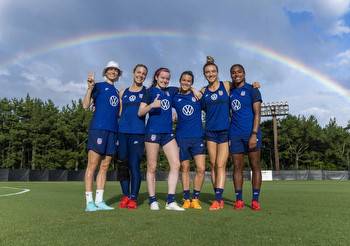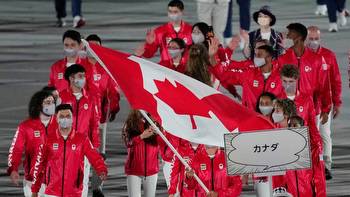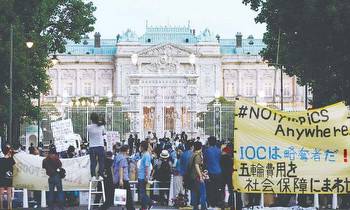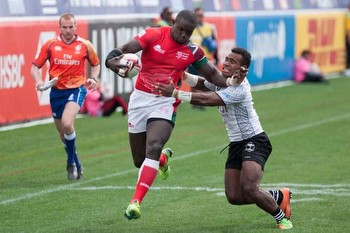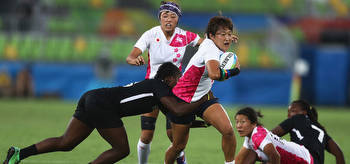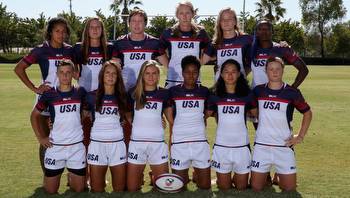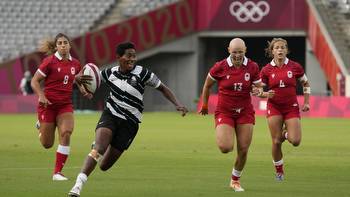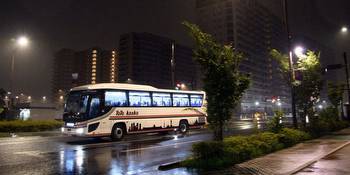Strohecker makes her mark with USA

SAN DIEGO — The nature of rugby sevens play dictates that things often happen quickly and there is little time to adjust.
It’s seven-on-seven and the matches last roughly 15 minutes. Entire tournaments are played in two or three days.
Liz Strohecker, a 2003 graduate of East Palestine High School, knows this all too well in her years involved in the sport.
Now, as operations manager for the USA Rugby women’s sevens Olympic team she is front-and-center in one of the most challenging logistical environments ever faced by a global sporting event. Authorities in Japan and with the International Olympic Committee are plowing forward with the postponed 2020 games set to begin on July 23 in Tokyo despite the continued threat of the COVID-19 pandemic.
“The tricky part with logistics is it’s tough having any information when everything changes so quickly,” Strohecker said. “Even now, we leave in less than a week and we’re still getting updates. It’s planning for A, B, C and D and it’s having to come up with a plan E when all of those go wrong.”
Like their peers in other sports across the globe, USA Rugby was put on pause in March 2020 after returning home from tournaments in Australia and New Zealand. Already saddled with financial challenges before the pandemic hit, USA Rugby was forced to file Chapter 11 bankruptcy on March 31, 2020. The COVID pause and bankruptcy cost Strohecker her job from April until August 2020 when USA Rugby emerged from bankruptcy and developed a five-year plan to repay creditors.
“It wasn’t ideal,” Strohecker said. “The staff on the women’s side had established a pretty good working relationship with each other and the hope was always that we would come back to continue on through the postponement. We were fortunate to do that.”
Players were trained remotely from April to August 2020 but did continue getting paid. When full training did resume, Strohecker was involved with developing safety protocols at the training site. The sevens team’s first international tournament back came in February in Spain but that tournament was abandoned by the team before it was completed.
“There were a lot of bumps in that one because that was really the first tournament most of us had done internationally under COVID,” Strohecker said. “We were just kind of dipping our toes in the water at that point.”
Tournaments in Dubai and Los Angeles followed and those went smoothly as staff and players knew what to expect with COVID protocols. The Olympics will be a different beast as it will mark the first time all of the core nations involved in the sport will compete in an international tournament since the pandemic began.
Strohecker, who lives in San Diego and works with the team at the U.S. Olympic and Paralympic Elite Athlete Training Center in Chula Vista, joined USA Rugby in her current position in January 2018 after leaving a laboratory science career. Her rugby career including playing at the University of Connecticut and with clubs teams in Virginia and San Diego. She retired from playing in 2014 but continued to have a hand in the game at the organizational and coaching levels.
“(My duties include) anything that has to do with logistics, all travel preparation, all travel booking, jerseys, equipment, budgeting and a pretty robust personal development program which helps players adjust to life outside of rugby when they are finished,” Strohecker said.
The team generally travels to six to eight international tournaments per year and a lot of that planning falls on Strohecker’s shoulders. For instance, the rugby team is set to depart for base camp on July 13. That base camp is located in Mimasaka, Japan and will last about a week. Strohecker said that the team will then take the three hour bullet train or eight to nine hour bus ride to Tokyo to the Olympic Village.
“We were fortunate enough for the city (Mimasaka) to still host us this year,” Strohecker said. “But United (Airlines) changed their flights and we were not able to fly directly into the city we wanted to. We had to spend a couple weeks just trying to find a way into Japan.”
The list of what athletes and the rest of the delegation needs to do is very large at this point and may still get larger.
“There’s been a lot more to do now this year than if we did not have COVID. We have a ton of apps we have to download. Information we have to fill out. Vaccine cards to show. Tests to take. It’s all about having the information that the delegation needs to get in the country and be safe once we get there.”
Strohecker is not going in blind. She traveled to Tokyo in Nov. 2019 to tour the Olympic sites including the Olympic Village.
“The village was not completely constructed by then, so we did not get to see a whole lot of what that would look like,” Strohecker said. “It will be kind of a surprise when we get there. We know it was constructed without knowing COVID was going to happen, so there will be adjustments we will have to make.”
To put it lightly it will not be like a usual Olympic Games.
“We’re basically going to be in our rooms the whole time trying to avoid contact with anyone else,” Strohecker said.
The athletes will walk in the opening ceremonies (staff will not) but masks and social distancing will be required. Strohecker said the staff will have to view the opening ceremonies off site.
Athletes will not be able to attend other athletic events or take part in any of the traditional commraderie with other athletes from around the globe. No friends or family will be allowed in Tokyo.
The women’s rugby competition is set for July 28 through July 31 at the 50,000-seat Tokyo Stadium built in 2001. The closing ceremonies are Aug. 8. but the team will leave the country on Aug. 2. All athletes must leave the Olympic Village within 24 hours after competing.
Strohecker said if the team registers a medal at the Games, it could mean a much-needed funding boost for the program.
“In addition to fulfilling all of the players dreams, it would help the program in the long run,” Strohecker said.
Notes
¯ The United States has drawn hosts Japan, China and 2016 Rio gold medalists Austrailia in its group.
¯ Strohecker points to veteran Alev Kelter and young up-and-comer Ariana Ramsey as fan favorites on the USA team.
“I know the whole team and everyone has something they do that I love watching on the field,” Strohecker said.
¯ USA women have 12-1 odds to gain the gold medal. New Zealand is the runaway favorite at 7-20 odds. Defending gold medalist Australia is at 13-2 odds to retain the championship. Canada sits at 8-1 odds, while France is 12-1.
“We are a gold medal contender,” Strohecker said. “With COVID we haven’t really seen the teams in over a year. We don’t know how that has affected those teams or what the training has been like. We don’t know what their competition has been like. Sevens in general is a game anyone can win at anytime and even moreso now with how COVID has affected everything. It will be interesting to see if the favorites are still at the top or if someone else unexpected does something.”
¯ Strohecker is scheduled to fly to Pittsburgh on Aug. 2 and visit family in East Palestine for about a week. She says her mom keeps up with her tournaments even if they are played at odd hours of the night.
“She’s always asking me to wish certain players good luck,” Strohecker said.
¯ Strohecker’s gameday responsibilities include getting the rosters to the appropriate people, doing coin toss, keeping track of substitutions, running video back and forth from analysts to coaches, making smoothies and recovery shakes for players, taking care of player needs, attending to disciplinary action issues as part of judicial hearings and staying with players if they are pulled for anti-doping testing.
¯ Magnetic darts and mini golf will be some of the options for in-room entertainment for players in Tokyo. Strohecker doesn’t anticipate a lot of down time as travel to the training fields is long. The team will also have access to the United States Olympic and Paralympic Committee’s training site where athletes can have a swim or a meal.
“The team is used to being on the road quite a bit, so they bring movies and books,” Strohecker said. “The team really likes to read a lot, so they have some book clubs they do together.”
WOMEN’S RUGBY SEVENS SCHEDULE
All matches at Tokyo Stadium
All Times EST
Wednesday, July 28
Pool play, 8 to 11 p.m. (six matches)
Thursday, July 29
Pool play, 3:30 to 6:30 a.m. (six matches)
Pool play, 8 to 11 p.m. (six matches)
Friday, July 30
9-12 placement matches (two matches), quarterfinals (four matches), 3:30 to 6:30 a.m.
9-10, 11-12 placement matches (two matches), placement matches 5-8 (two matches), semifinals (two matches), 8 to 11 p.m.
Saturday, July 31
5-6, 7-8 placement (two matches), bronze medal match, gold medal match, 3:30 to 6:30 a.m.

